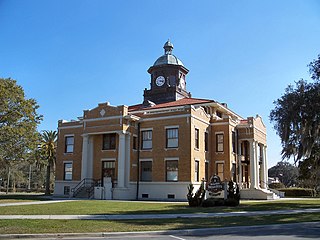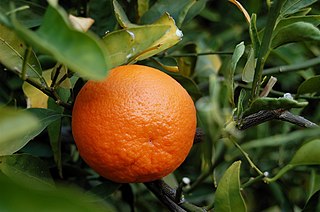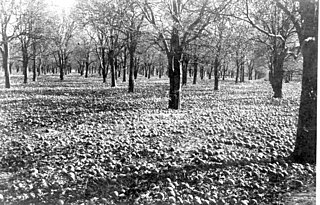
Calamansi, also known as calamondin, Philippine lime, or Philippine lemon, is an economically important citrus hybrid predominantly cultivated in the Philippines. It is native to the Philippines, Borneo, Sumatra, and Sulawesi in Indonesia in Southeast Asia, Malaysia as well as southern China and Taiwan in East Asia. Calamansi is ubiquitous in traditional Filipino cuisine. It is naturally very sour, and is used in various condiments, beverages, dishes, marinades, and preserves. Calamansi is also used as an ingredient in Malaysian and Indonesian cuisines.

Crystal River is a city in Citrus County, Florida, United States. The population was 3,108 in the 2010 census. According to the U.S. Census estimates of 2018, the city had a population of 3,162. The city was incorporated in 1903 and is the self professed "Home of the Manatee". Crystal River Preserve State Park is located nearby, and Crystal River Archaeological State Park is located in the city's northwest side.

Citrus County is a county located on the west central coast of the U.S. state of Florida. As of the 2020 census, the population was 153,843. Its county seat is Inverness, and its largest community is Homosassa Springs.

The tangerine is a type of citrus fruit that is orange in color. Its scientific name varies. It has been treated as a separate species under the name Citrus tangerina or Citrus × tangerina, or treated as a variety of Citrus reticulata, the mandarin orange. Citrus tangerina is also treated as a synonym of Citrus deliciosa. It is a group of orange-colored citrus fruit consisting of hybrids of mandarin orange varieties, with some pomelo contribution.

Citrus production encompasses the production of citrus fruit, which are the highest-value fruit crop in terms of international trade. There are two main markets for citrus fruit:

Citrus unshiu is a semi-seedless and easy-peeling citrus species, also known as miyagawa mandarin,unshu mikan, cold hardy mandarin, satsuma mandarin, satsuma orange, naartjie, and tangerine. Citrus unshiu was named after Unshu (Wenzhou), a famous production area of mandarin oranges in China, in the late Edo period of Japan. It is said to have originated in either Japan or China, and because of its name, it is often described as originating in China; however, due to multiple genetic studies conducted in the 2010s, the theory that the maternal species of Citrus unshiu was Kishu and the paternal species was Kunenbo and that it was created in the Satsuma province in Japan became more credible. During the Edo period, Kishu was the most popular because there was a popular superstition that eating Citrus unshiu (Satsuma) without seeds made people more prone to infertility. Citrus unshiu became popular in Japan after the modernization started in the Meiji period. It was introduced to the West from the Satsuma region of Japan in 1878.

California Citrus State Historic Park is an open-air museum in the state park system of California, United States, interpreting the historic cultural landscape of the citrus industry. The park’s museum exhibits and interpretive features share the story of the citrus industry's role in the history and development of Southern California, and is told through the experiences of the diverse migrant and immigrant groups who made it all possible. The California Citrus State Historic Park is in the city of Riverside in Riverside County, California, United States. The 248-acre (100 ha) park was established in 1993.

Citrus greening disease is a disease of citrus caused by a vector-transmitted pathogen. The causative agents are motile bacteria, Liberibacter spp. The disease is vectored and transmitted by the Asian citrus psyllid, Diaphorina citri, and the African citrus psyllid, Trioza erytreae, also known as the two-spotted citrus psyllid. It has also been shown to be graft-transmissible. Three different types of HLB are currently known: the heat-tolerant Asian form, and the heat-sensitive African and American forms. The disease was first described in 1929 and first reported in China in 1943. The African variation was first reported in 1947 in South Africa, where it is still widespread. Eventually, it affected the United States, reaching Florida in 2005. Within three years, it had spread to the majority of citrus farms. The rapid increase in this disease has threatened the citrus industry not only in Florida, but the entire US. As of 2009, 33 countries have reported HLB infection in their citrus crop.

The Key lime or acid lime is a citrus hybrid native to tropical Southeast Asia. It has a spherical fruit, 25–50 mm (1–2 in) in diameter. The Key lime is usually picked while it is still green, but it becomes yellow when ripe.
Tropicana Brands is a former American fruit-based beverage company. It was founded in 1947 by Anthony T. Rossi in Bradenton, Florida. Between 1998 and 2021 it was a subsidiary of PepsiCo, but in August 2021, 61% of Tropicana was sold along with the rest of PepsiCo's juice brand portfolio for $3.3 billion to PAI Partners. PepsiCo retained the remaining 39% of ownership.

Citrus canker is a disease affecting Citrus species caused by the bacterium Xanthomonas. Infection causes lesions on the leaves, stems, and fruit of citrus trees, including lime, oranges, and grapefruit. While not harmful to humans, canker significantly affects the vitality of citrus trees, causing leaves and fruit to drop prematurely; a fruit infected with canker is safe to eat, but too unsightly to be sold.

The madarinquat, also misleadingly called orangequat, is any cross between a mandarin and a kumquat. Mandarinquats are members of the citrofortunella group.

An orange is a fruit of various citrus species in the family Rutaceae ; it primarily refers to Citrus × sinensis, which is also called sweet orange, to distinguish it from the related Citrus × aurantium, referred to as bitter orange. The sweet orange reproduces asexually ; varieties of sweet orange arise through mutations.

Sweet lemon and Sweet lime refer to groups of citrus hybrids that contain low acid pulp and juice. They are hybrids often similar to non-sweet lemons or limes, but with less citron parentage. Sweet limes and lemons are not sharply separated:
The sweet lime, Citrus limettioides Tan., is often confused with the sweet lemon, C. limetta Tan., which, in certain areas, is referred to as "sweet lime". In some of the literature, it is impossible to tell which fruit is under discussion.

The Star–Banner is the daily newspaper in Ocala, Florida, United States, and serves Marion County and the surrounding communities. The Star-Banner has a daily circulation of about 43,000, and is the 19th-largest newspaper in the state of Florida.

The Florida Digital Newspaper Library provides access to the news and history of Florida through local Florida newspapers. The Florida Digital Newspaper Library is supported by the University of Florida's George A. Smathers Libraries and hosted in the University of Florida Digital Collections funded partially by grants and sources, including Florida's Library Services and Technology Act (LSTA) Grants Program, the National Endowment for the Humanities' National Digital Newspaper Program, the Institute for Museum and Library Services, the University of Florida, by Florida Heritage Project funds from the University of North Florida and the University of South Florida, and with the assistance of digital library endowment from the Estate of the late Governor and Mrs. C. Farris Bryant.

The Great Freeze is the back-to-back freezes of 1894–1895 in Northern Florida, where the brutally cold weather destroyed much of the citrus crop.

Cold-hardy citrus is citrus with increased frost tolerance and which may be cultivated far beyond traditional citrus growing regions. Citrus species and citrus hybrids typically described as cold-hardy generally display an ability to withstand wintertime temperatures below −5 to −10 °C. Cold-hardy citrus may be generally accepted 'true' species or hybrids involving various other citrus species. All citrus fruits are technically edible, though some have bitter flavors often regarded as unpleasant, and this variability is also seen in cold-hardy citrus fruits. Those listed as "inedible fresh" or "semi-edible" can be cooked to make marmalade.
The Florida Department of Citrus (FDOC) is an executive state agency for agriculture in Florida in charge of regulating, researching and marketing the state's citrus industry and citrus research. Its headquarters are in the Bob Crawford Agricultural Center in Bartow. Its Economic Research department is located at 2125 McCarty Hall in the University of Florida in Gainesville, and its Scientific Research department is in Lake Alfred.

The December 1989 United States cold wave was a series of cold waves into the central and eastern United States from mid-December 1989 through Christmas. On December 21-23, a massive high pressure area pushed many areas into record lows. On the morning of the 22nd, Scottsbluff, Nebraska, experienced −42 °F (−41 °C). The next morning, the front pushed temperatures in Houston down into the single digits. On the 24th and 25th, Miami experienced freezing temperatures and Key West tied its December low of 44 °F (7 °C). The wave extended all the way into Mexico's Lower Rio Grande Valley, resulting in tens of millions of dollars in damage to the agricultural sector. The December cold wave was actually the second of the year, after a February cold wave had extended into Texas.


















